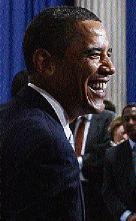Overhaul of Wall Street rules: Obama's heavy lift
Published: Friday | September 18, 2009

Obama
Presidential candidate Barack Obama was accused by his opponents of having a messiah complex. Attack advertisements depicted him walking on water, promising to save the planet and other great things, but being unprepared and totally inexperienced in the business of government. It is so ironic that today, elected and sworn in as United States president, Barack Obama may actually be required to do some of the enormous heavy lifting implied in those attack ads. He is now required to tackle some pretty big tasks, not only for his country but the world.
The complexity of these tasks can truly be described as Herculean, perhaps impossible. Merely to capture their complexity in plain words is hard. But as the genius physicist, Nobel laureate Richard Feynman, believed, if you cannot explain it to your cleaning lady, you are not on top of your subject. So try we must. What's in the canvas for us to see?
First, there is health care, a matter of choice some say but one of necessity as seen by Obama and late liberal lion, Ted Kennedy, both as a moral issue and for prosperity of the US economy.
Then there's Wall Street regulation to avoid another Great Depression. All of this must be accomplished amid incredibly hostile Republican and corporate opposition fuelled by billions of dollars and an amazing gullibility among segments of the US population.
Racism
As none other than former President Jimmy Carter and Representative Clyburn have told us in the past few days, racism did not die with election of the first black man, the first African American (actually Obama is bi-racial - viewing him as African-American or black is itself part of the complexity of race relations) to hold the job.
Carter bemoaned the fact that some felt African Americans are unqualified for the job of president of "this great country". So the first thing is that the president faces highly resourced and deeply self-interested political opposition. Lobbying expenditures in excess of a million dollars per day are not unusual.
Second, there's an irrational fear that sits there to be exploited politically. Bearing arms at town hall meetings is a bit off the wall, you would think. Shouting "you lie" at the president as he addresses a joint session of Congress is sort of unheard of and unexpected. Perhaps it may work in the British Parliament or Gordon House where the traditions are different. This outburst and the way it has been 'welcomed' suggest there is a coalescing of diverse opposition forces against the president's efforts.
But now to the major focus of attention this week - regulation on Wall Street. September 15 marks the anniversary of the collapse of one of the world's biggest investment houses. Indeed, it can be argued that Lehman Brothers' collapse was necessary to save the world financial system. Without it, Secretary Paulson and Federal Reserve Chairman Bernanke could not have gained approval for their US$700 billion Wall Street bailout. Yet the regulatory laxity which allowed the excess is still in place.
Tough talk
Obama's speech this week to the Street's moguls is full of tough talk. He is clear that 50-1 leverage is off the table, so are huge and unwarranted compensation packages and innovation of the type that created incomprehensible derivatives. But who is listening? Who in Congress will back the required changes?
Then what about the fight among the regulatory agencies - the Fed and SEC?
Amid all the chatter, lobbying interests of the financial industry are the elephant in the room. The G-20 meets shortly yet there is no consensus among Europe the United Kingdom and the US, not to mention China and India.
The required overhaul, to be effective, must be comprehensive. The only clear agreement among all concerned is that both overhaul and consensus are necessary. This surely is not sufficient to guarantee regulatory reform robust enough to avoid another, this time truly catastrophic meltdown.

Wilberne Persaud, Financial Gleaner Columnist
wilbe65@yahoo.com


















